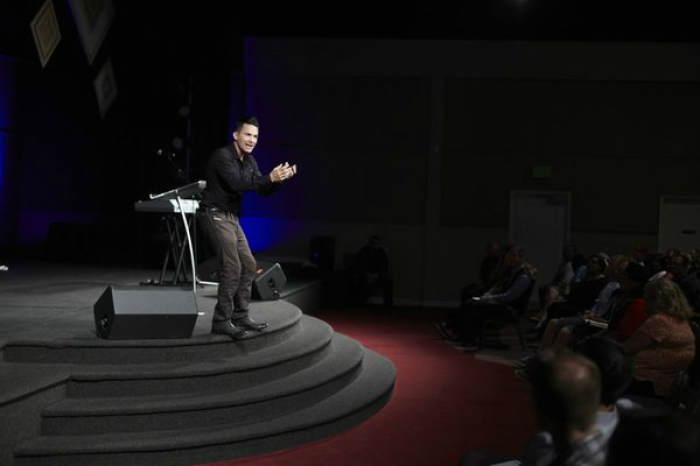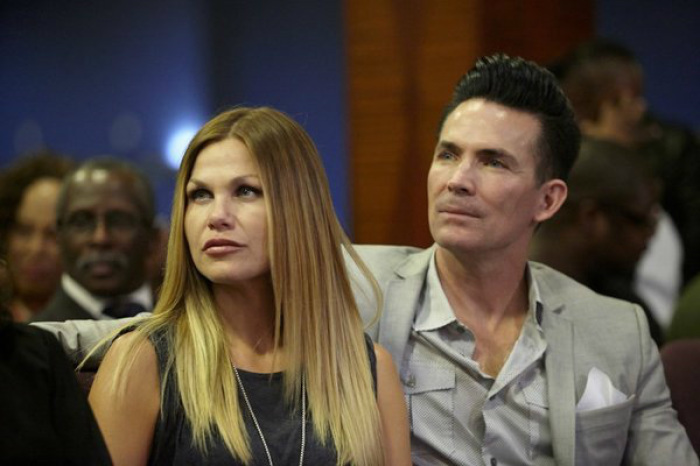'Preachers of LA' Exclusive: Jay Haizlip Talks God's Deliverance From Drugs; Defends Controversial Series

Pastor Jay Haizlip of The Sanctuary, a nondenominational church in Huntington Beach, Calif., recently spoke with The Christian Post about his ministry, how he first learned about Jesus Christ while on his way to buy drugs, and why he believes God wants to use "Preachers of L.A" to reach those who might otherwise never step foot into a church or tune into Christian TV.
Haizlip stars alongside five other Southern California Christian ministers in the Oxygen network docu-series, premiering Wednesday, Oct. 9. The others are Bishop Noel Jones of City of Refuge, recording artist Deitrick Haddon, Pastor Wayne Chaney of Antioch Church of Long Beach, Bishop Ron Gibson of Life Church Of God In Christ in Riverside, and Bishop Clarence McClendon of Full Harvest International Church in Los Angeles (learn more about the ministers here).
Haizlip, 50 and married with three children, rose to fame when he became a sponsored skateboarding pro in his early teens and remains a notable pioneer in the sport. But his fame and victories on the halfpipe were soon overshadowed by a cocaine addiction after his first encounter with the drug at 15. For the next several years, while married and responsible for a newborn, he was in and out of rehab, desperate to kick the habit he knew was ruining his life and relationship with his family.
"I didn't become a major drug addict overnight, but I would say within a couple of years, a few years after doing cocaine for the first time, that's when it really began to get a hold of me. I began to lose everything and throughout my 20s it was very hard because for 12 years I was just a coke addict," the Alabama native told CP. "In that time frame, I ended up getting sentenced to two years in prison (and) I spent six months incarcerated. I was in and out of treatment centers. I voluntarily placed myself in them trying to change my life. I wanted to be a better person. But I couldn't get free. I mean the power of cocaine had such a strong hold on me that it literally drove me to do things I didn't want to do."
Freedom did not come until one day in 1990, after leaving another rehab facility with the intent of getting loaded, when Haizlip, found himself sitting on the edge of his bed at home and, as he put it, begging God for help.
"I remember sitting there and I felt so desperate ... and I thought, 'I've tried everything in the world to change my life, everything that the world says is its answer to my problem, none of it's helped me. And I've honestly tried with everything I could to do those things.' In that moment I felt like dying would be easier than living, and I honestly contemplated committing suicide. I thought, 'If this is life all has to offer me, living hurts too bad. I would rather die than live.' Because somehow that seemed like it wouldn't be as painful."
Haizlip, who said he had never been "anti-God" just more concerned with living by his own rules, believes God heard his prayer and eventually led him to a man "who shared Jesus with me in a way that I'd never heard anybody talk about Jesus."
"So that man led me to Jesus, and when I was praying with him, I felt all the hurt, all the weight, all the pain from everything I'd ever done. I literally felt like it was just coming out of me, off of me. It was like every chain broke off of me, all of the stuff that had held me as a prisoner, it just fell off me."
Haizlip said that was the last time he got high, crediting God for doing in one second what he had been trying to do by himself for years.
Now thinking he literally had "tapped into some ancient spiritual secret that nobody knew about and everybody was gonna want," Haizlip said he "immediately began to start telling everybody about what Jesus had done in my life, thinking that they're gonna want what's happened to me..."
The first places he went to share the good news about what God had done for him were the same housing projects and a "hardcore neighborhood" he had frequented for the past two years to buy drugs.
Below is a transcript of the remainder of The Christian Post's interview with Pastor Haizlip. It has been edited for brevity.
CP: How did people respond? They see you, not too long ago, coming to get a hit, and then all of a sudden you're talking about Jesus.
Haizlip: At first, they were standoffish, they were like 'What's up with this dude?' you know, 'We know who you are.' They were skeptical. But I sensed in my heart even though I was just a newborn person with the Lord, I really sensed in my heart like God said, 'They've had a lot of people in and say something and leave, and then never see them again.' I felt like God said, 'I want yo to be consistent at reaching out to this neighborhood.' And I didn't quit, so consistently I reached out to that neighborhood. Over a period of time, I began to win the confidence of the community and I began to win the confidence of the people that were down there. They realized I didn't have an ulterior motive. … They realized this guy is sincere, he's genuine, he cares about us.
CP: Tell me a little about your church, The Sanctuary.
Haizlip: Not long after I got saved and started in ministry, all through the '90s I was an evangelist primarily, all over America,and went to other countries as well. But God really began to start dealing with me and Christy, my wife, about coming back to California. I'd lived here, before her and I had gotten married, and God just really started dealing with me that we were to come here and to plant a church and start a church. So about 11 years ago, we moved. We sold our house, sold everything we had, walked away from all the stuff we had going on. People thought we were nuts, thought we were crazy, questioned why we were doing what we were doing, but we really sensed God wanted us to do this.
We moved to Huntington Beach without the promise of anything. There wasn't an established church, there wasn't any promise of anything. All we had was the leading of God and the promise that He put in our heart and the indication that He wanted to use us. So we started in a community center with a handful of broken people, a couple of blocks off the beach. Little by little the church grew, and the church has been in existence for 10 years. We have eight services a week, four on the main campus every Sunday, one at our Los Angeles campus … then we have multiple mid-week services and different things we have going on. The church (size) is about 2,000-ish.
CP: What's your congregation look like? Younger, older, multiethnic, etc.?
Haizlip: Our church is very diverse, I love our church. There's all kinds of ethnicities there, all kinds of social backgrounds. It is not unusual to see a high-end luxury car like a Bentley in our parking lot and a few shopping carts, where people are homeless and they push their shopping cart up to the church to come in. The majority of our church is 20s-40s, even though we have people of all ages there. I think the oldest lady is probably like 88. Our church is very youthful. I love the way it is. If our church was all one kind of church, me personally, that wouldn't appeal to me. I love the diversity of our house.
There was a service where I remember I was standing on the platform preaching one day, and I look out at this row. There's a famous English actress, sitting next a very famous music producer, sitting next to this almost-homeless struggling heroin addict. I just looked at the diversity that was just sitting on this row. None of them knew each other but they're all sitting beside each other. I remember thinking to myself, 'This is so beautiful.' We've got gang members, we've got lawyers, we've got entertainers and famous musicians and all of these people sitting in here, and the only thing some of them have in common — it's Jesus.

CP: Most people were introduced to "Preachers of L.A." through the first trailer that seemed to emphasize wealth, materialism and flashy lifestyles, which gave some viewers the impression that that's what the show is about — a group of prosperity preachers living large. What's your response to that?
Haizlip: I can understand people's initial perception, like 'Wow, what is that?' But think about this, when an initial trailer is shown for a movie that's about to be in the theaters they show you just little glimpses that spark your attention and cause you to want to go and see that movie. … That initial trailer, it served its purpose. It has got a massive amount of people talking about this show, whether they agree with it or not. There is a huge interest in this show, and there are gonna be a lot of people watch it to see what it really is. ...




























